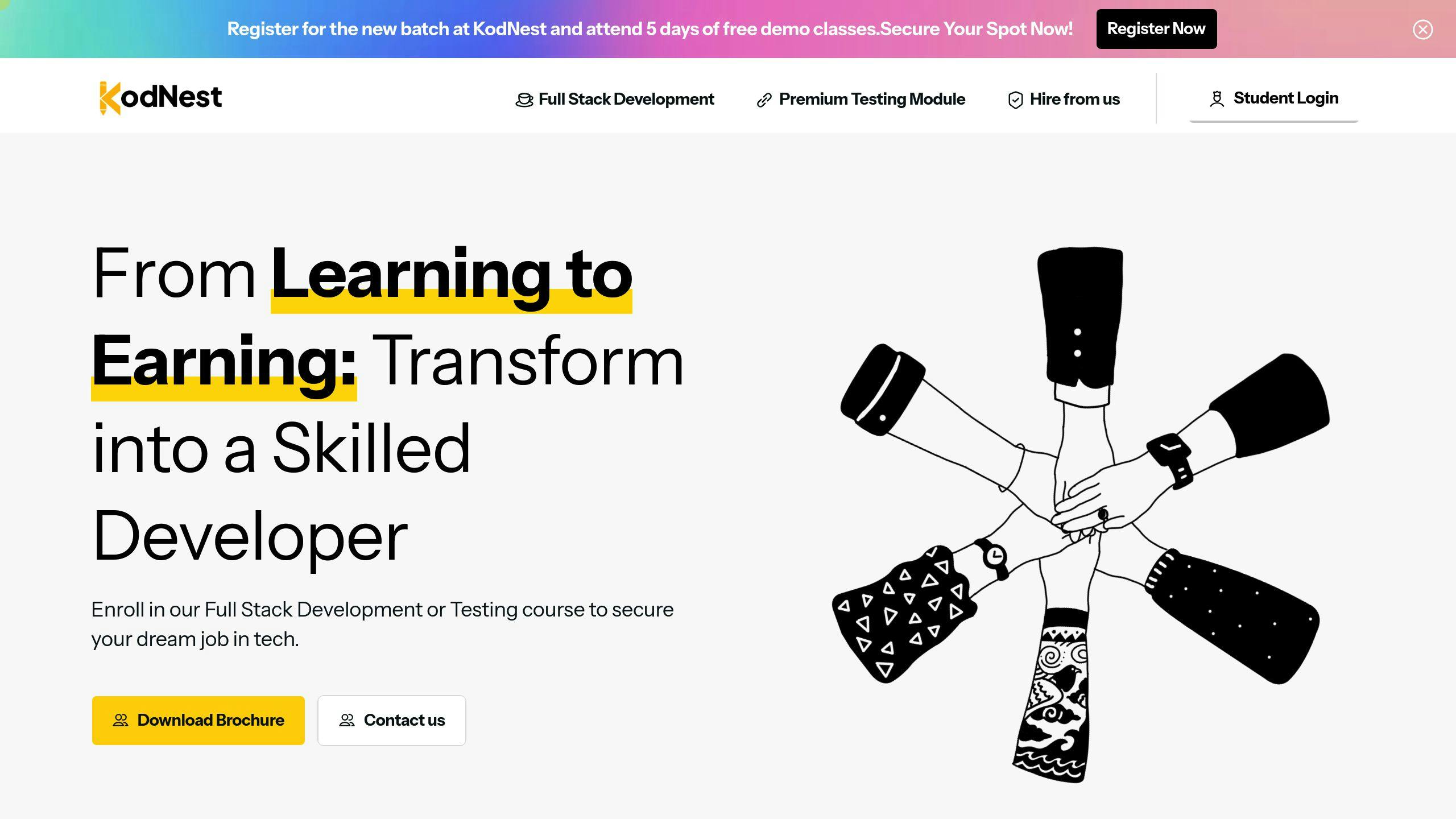Looking to become a full stack developer in India? Choosing the right training institute is key to gaining the skills and industry connections needed for a successful career. Here’s what sets the top institutes apart:
- Curriculum Quality: Updated to match industry needs, covering front-end, back-end, and advanced tools like cloud computing and DevOps.
- Hands-On Projects: Practical experience through real-world projects and hackathons.
- Faculty Expertise: Mentorship from experienced professionals working in top tech companies.
- Placement Support: Strong industry ties for job opportunities and career guidance.
Quick Comparison
| Institute | Strengths | Weaknesses | Price Range |
|---|---|---|---|
| KodNest | Budget-friendly, AI-driven mentorship, 90% placement rate | Limited course options, newer in the market | ₹26,999 – ₹31,999 |
| Scaler | Advanced topics, strong mentorship, industry connections | Expensive, time-intensive | ₹2.5L – ₹3.5L |
| Udemy | Self-paced, affordable, wide variety of courses | No placement support, quality varies | ₹800 – ₹16,000 |
| UpGrad | 50+ projects, internships, 85% placement rate | High cost, long duration | ₹2.6L – ₹3L |
Whether you prefer affordable, flexible learning (Udemy, KodNest) or structured, career-focused programs (Scaler, UpGrad), your choice should align with your goals, budget, and learning style.
Best IT Training And Placement Institute For Full Stack Development
1. KodNest

KodNest has carved a niche in India’s full stack development training scene with its well-rounded approach to technical education and career readiness. Founded by Akash Pandey, the institute has gained a reputation for delivering training programs that align closely with industry needs.
The curriculum is designed to prioritize practical skills, focusing on areas such as:
| Training Focus | Key Features |
|---|---|
| Technical Skills | Front-end (HTML, CSS, JavaScript), Back-end (Node.js), Databases (MongoDB) |
| Practical Projects | Projects based on real-world applications |
| Career Support | Mock interviews and hackathons |
| Mentorship | Guidance from experienced industry professionals |
KodNest emphasizes learning by doing, offering students opportunities to work on projects led by experts and connect with industry professionals. This blend of mentorship and hands-on experience ensures students gain the skills that tech companies value most.
The institute boasts an impressive 90% placement rate, thanks to a combination of factors:
- Advanced Curriculum: Includes topics like cloud computing and DevOps.
- Real-World Projects: Simulates actual work scenarios to build practical expertise.
- Industry Connections: Partnerships with top tech companies that offer networking and placement opportunities.
KodNest also leverages AI-driven mentorship to provide tailored guidance. This helps students tackle challenging concepts and strengthen problem-solving abilities. By addressing individual learning needs, the program ensures students are ready to excel in their careers.
While KodNest shines with its practical training and placement success, other institutes like Scaler offer their own unique advantages, which we’ll discuss next.
2. Scaler

Scaler, founded by IIT alumni Anshuman Singh and Abhimanyu Saxena, has become a key name in India’s full-stack development training space. It blends in-depth technical education with hands-on, industry-relevant training.
Here’s a breakdown of Scaler’s curriculum:
| Training Component | Focus Areas |
|---|---|
| Core | Algorithms, System Design |
| Full-Stack | Front-end, Back-end, Databases |
| Advanced | Cloud Computing, DevOps |
| Career Development | Soft Skills, Interview Prep |
What sets Scaler apart is its mentorship program. Students are paired with professionals from leading tech companies like Google and Amazon. This ensures they get guidance that’s directly aligned with current industry trends.
Scaler prioritizes practical, project-based learning. Some examples of projects include:
- Building scalable e-commerce platforms
- Developing cloud-native applications
- Creating secure payment systems
Additionally, Scaler collaborates with top companies to provide internship opportunities and job placements. Career counseling is also part of the package. The program costs between ₹2.5 to ₹3.5 lakhs, which covers mentorship, project work, and career support.
The platform’s strength lies in its focus on real-world tools and technologies, such as Google Cloud Platform and Amazon Web Services. This ensures students are equipped to handle modern development challenges.
If you’re looking for a structured, mentor-driven program with a focus on practical learning, Scaler is a strong choice. It offers a more guided experience compared to platforms like Udemy, which cater to self-paced learners with a wider range of course options (more on that in the next section).
3. Udemy
Udemy operates as a marketplace, offering a wide range of full stack development courses taught by industry professionals. This setup allows learners to pick courses that align with their career goals and preferred learning styles.
Udemy’s full stack development courses emphasize hands-on learning, covering both front-end and back-end skills. Here’s a breakdown of what learners can expect:
| Learning Component | Details |
|---|---|
| Core Technologies | HTML, CSS, JavaScript, Node.js, Python |
| Project Work | Building RESTful APIs, Web Apps, and other practical projects |
| Support System | 24/7 Customer Support, Community Forums |
| Learning Format | Self-paced, Lifetime Access to Course Materials |
| Price Range | ₹800 – ₹16,000 |
One of Udemy’s standout features is its flexible learning format. Students can access materials anytime, anywhere, making it ideal for those balancing work or other commitments. This flexibility is especially useful for professionals aiming to upskill without disrupting their current routines.
Courses on Udemy often include project-based learning, where students work on real-world tasks like creating e-commerce platforms or enterprise-level applications. This approach ensures learners gain practical experience while building their portfolios.
Another advantage is Udemy’s pricing. Courses are affordable and frequently discounted, making quality education accessible to a broader audience. However, the self-paced nature of the platform requires learners to stay motivated and disciplined to make the most of their training.
While Udemy is a great option for flexible, budget-friendly learning, it may not offer the structured, career-focused guidance found on platforms like UpGrad. Still, with its extensive course catalog, Udemy caters to a wide range of skill levels and learning objectives, from beginners to advanced developers.
sbb-itb-f454395
4. UpGrad
UpGrad is a prominent name in India’s full stack development training space, offering a well-rounded program that blends theory with hands-on practice. Their courses run for 12 to 18 months, providing a deep dive into both foundational and advanced topics.
| Learning Component | Details |
|---|---|
| Course Duration | 12-18 months |
| Program Fee | ₹2,60,000 – ₹3,00,000 |
| Practical Experience | 50+ projects and case studies |
| Industry Experience | 6-month internship experience letter |
| Placement Rate | Over 85% |
Unlike platforms like Udemy, which are designed for self-paced learning, UpGrad offers a structured, mentor-led program aimed at long-term career advancement. The curriculum is regularly updated to align with industry demands, ensuring students are equipped with relevant skills.
Students also gain access to a strong support system, including instant doubt resolution and a vibrant community of peers and alumni. Career services like counseling, resume building, and interview preparation further enhance their job readiness.
The courses are taught by industry professionals who share real-world insights and best practices. UpGrad’s connections with major companies, including Google and Amazon, open up placement opportunities for graduates. Their use of AI-driven personalization ensures that learning support is tailored to each student’s pace and goals.
Although the program fee is on the higher side, the extensive training, hands-on projects, and solid placement record make it a worthwhile investment for those committed to a career in full stack development. The flexible schedule also makes it suitable for working professionals looking to upgrade their skills.
UpGrad offers a structured, career-oriented learning experience for aspiring developers. In the next section, we’ll weigh the strengths and weaknesses of each institute to help you make an informed choice.
Pros and Cons of Each Institute
Here’s a closer look at the strengths and weaknesses of some of the top full stack development training institutes in India. This comparison will help you weigh your options and decide what works best for you.
| Institute | Strengths | Weaknesses |
|---|---|---|
| KodNest | – AI-driven mentorship platform – Unlimited placement support – Affordable pricing (₹26,999 – ₹31,999) – Hands-on projects and hackathons |
– Relatively new in the market – Limited course options – Focuses mainly on Java and Python |
| Scaler | – Covers advanced topics like AWS and Docker – Strong industry connections – Comprehensive curriculum – Experienced faculty |
– Expensive – Requires significant time commitment – May be too advanced for beginners |
| Udemy | – Flexible, self-paced learning – Wide variety of courses – Affordable pricing – Lifetime access to materials |
– Limited hands-on support – No direct placement assistance – Quality of instructors varies – No structured mentorship |
| UpGrad | – 50+ hands-on projects – 6-month internship opportunity – Over 85% placement rate – Industry-expert instructors |
– High pricing (₹2.6-3L) – Long course duration (12-18 months) – Higher entry requirements |
This table gives a clear snapshot of what each institute offers and where they fall short. Let’s break it down further:
Curriculum and Focus
KodNest emphasizes Java and Python basics, making it a good choice for those starting out. UpGrad prioritizes structured, practical learning with projects, while Scaler dives into advanced tools like Docker and AWS. Udemy stands out for its variety and flexibility, though it lacks a structured approach.
Practical Learning
Practical experience is essential for building a strong portfolio. UpGrad shines here with over 50 projects and internship opportunities. KodNest focuses on hackathons to simulate real-world challenges, while Scaler and Udemy lag in this area.
Career Support
KodNest offers unlimited placement support, and UpGrad boasts an impressive placement rate of over 85%. Scaler uses its industry connections to help with job placements. On the other hand, Udemy doesn’t provide any direct career assistance.
Cost and Time Commitment
KodNest is the most budget-friendly option, with prices ranging from ₹26,999 to ₹31,999. UpGrad, while offering extensive resources, has a hefty price tag of ₹2.6-3L. Scaler offers flexible payment plans, and Udemy’s pricing varies depending on the course. Time commitments also vary, with UpGrad requiring up to 18 months, while Udemy allows you to learn at your own pace.
Instructor Quality
UpGrad and Scaler rely on industry experts to provide practical insights. KodNest uses an AI-driven mentorship approach, which is unique but may lack a personal touch. Udemy’s instructor quality can vary widely depending on the course.
Ultimately, your choice will depend on your career goals, budget, and preferred learning style. Think about factors like time availability, mentorship needs, and placement opportunities before deciding.
Conclusion
Looking at full stack development training in India, it’s clear that some institutes stand out due to their unique teaching methods and offerings. Comparing institutes like KodNest, Scaler, UpGrad, and Udemy reveals how they cater to different learning needs.
Curriculum and Learning Style
Top programs focus on industry-relevant content. KodNest emphasizes core technologies like Java and Python, using an AI-supported approach, while UpGrad offers over 50 hands-on projects to ensure practical learning.
Cost vs. Value
KodNest is a great choice for those on a budget, while UpGrad appeals to learners seeking more extensive, premium training. The value often depends on the depth of the program and the placement opportunities provided.
Career Support
Strong placement support is a priority for leading institutes. Both KodNest and UpGrad integrate career development into their programs, though their approaches differ, offering students tailored support to kickstart their careers.
Hands-On Learning
Practical skills are non-negotiable in this field. Institutes like KodNest and UpGrad ensure students gain real-world experience through projects and hackathons, helping them build portfolios that impress employers.
The full stack development field in India is growing rapidly, and staying competitive means choosing the right training. Whether you prefer a cost-effective option or a high-end program, focus on finding one that matches your career goals and learning style.
FAQs
Which certification is best for full stack developer in India?
Choosing the right certification for full stack development in India depends on your career goals and the program’s relevance to industry demands. Here’s a quick overview of some top programs:
| Institute | Program Highlights | Certification Focus |
|---|---|---|
| KodNest | Full Stack Development Certification | Focus on Core Java and Python, with placement-oriented training |
| Scaler | Full Stack Development Program | Specializes in advanced system design and cloud computing |
| UpGrad | Full Stack Software Development Program | Emphasizes enterprise-level development and includes internship opportunities |
| Udemy | The Complete Web Development Bootcamp | Covers a wide range of technologies with a flexible learning path |
Key factors to consider when choosing a certification:
- Programs that offer a relevant curriculum, hands-on projects, and career support that employers value
- Certifications recognized by the industry and aligned with current market trends
- A balance between theoretical knowledge and practical skills to ensure well-rounded expertise
In India, mid-level full stack developers typically earn between ₹5.9L and ₹10.5L annually [1]. While certifications can boost your credibility, building practical skills and a strong portfolio is equally important for long-term success.
The best certification ultimately depends on your goals, but don’t forget: your skills and portfolio often speak louder than any certificate.





